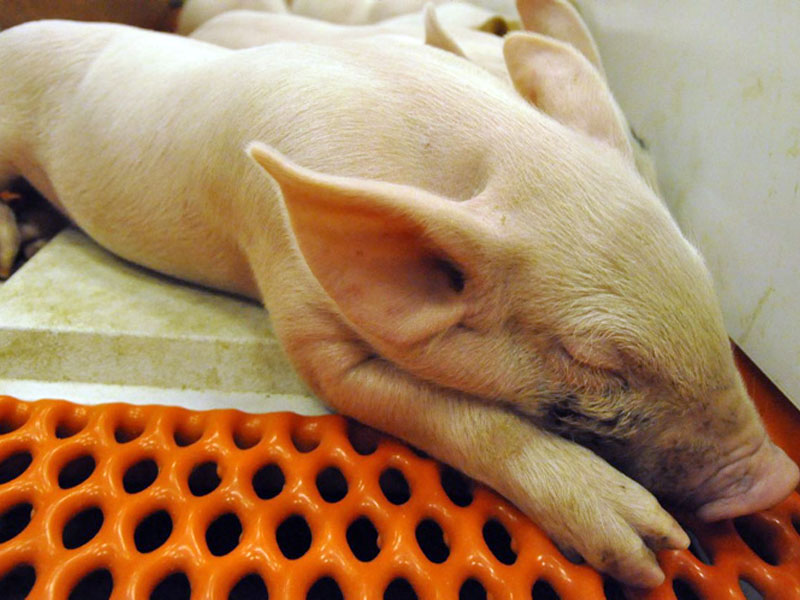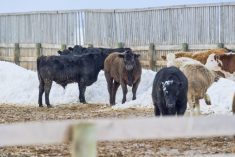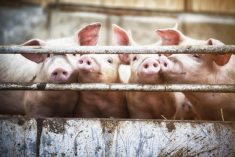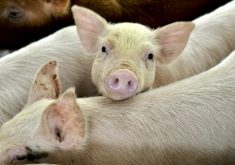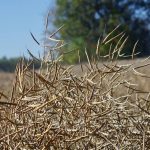All sectors of Manitoba’s pork industry are being urged to step up their vigilance and biosecurity measures especially regarding transportation, now that Porcine Epidemic Diarrhea virus (PEDv) has been detected in Ontario.
Last Friday the Manitoba Pork Council held a town hall-style conference call aimed at keeping the industry abreast of the situation. Chairman Karl Kynoch said that it’s important to keep the perception of heightened risk in perspective.
“Since the virus has broken out in Ontario, it has really come to the attention of producers,” he said. “But Ontario is a 24-hour drive away, we’ve got to remember that this virus is only five hours away in Minnesota.”
Read Also
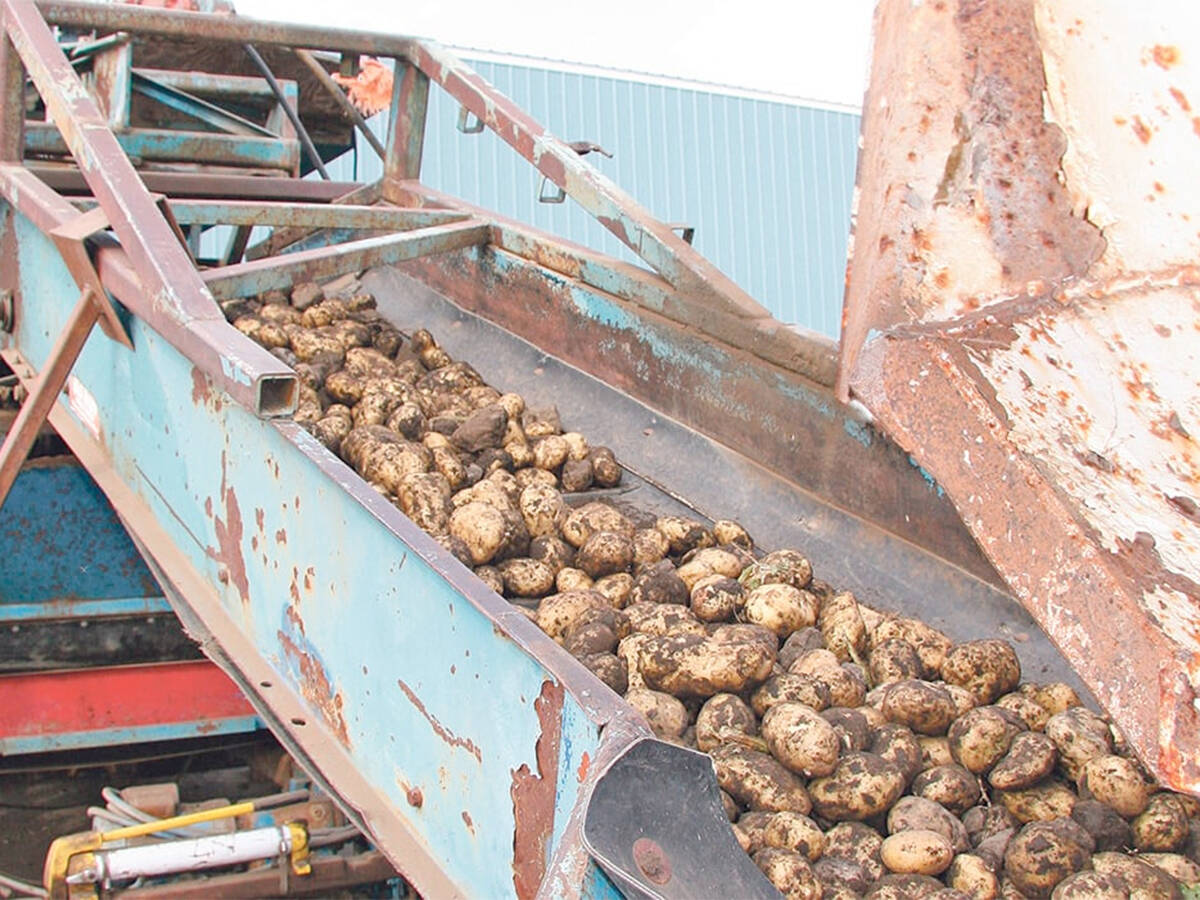
Potato growers beware new PVY strains
Newer strains of potato virus Y (PVY) are creating headaches for potato farms in Eastern Canada, and Manitoba farmers should pay attention
Kynoch urged the industry to work together the fight the virus, adding that if a neighbour’s farm does get infected, “they are not the enemy.”
Dr Glenn Duizer, Manitoba’s acting chief veterinarian, said that although PEDv is not a provincially reportable disease, its resemblance to transmissible gastro enteritis (TGE), which is, means that any suspicious cases should be reported.
“If you see something on your farms that is suspicious, such as a sudden change in diarrhea in feeders or nursing pigs, please contact your veterinarian right away,” said Duizer, adding that to encourage early reporting, the province will pay for 100 per cent of the lab-testing costs.
Starting Feb. 3, the OCV will be working with slaughter plants, assembly yards and truck wash stations to establish an effective surveillance program.
Creating zones
If a positive case is discovered in Manitoba, the authorities will notify all stakeholders and take steps to contain the outbreak on the infected farm by creating a zone within which all other producers will be advised to immediately ramp up their biosecurity, said Duizer.
“You have the right to turn away a truck from your farm if it is not cleaned to your satisfaction,” he said, adding that the trucking industry has agreed to segregate trucks running pigs across the U.S. border.
All nearby herds or those that have had contact with the infected site will be tested to prevent its spread. If multiple farms are infected, efforts will focus on maintaining the flow of feed to the farm and pigs to slaughter in an efficient, biosecure manner while helping the farms recover.
Duizer added that the province will not release private details about infected sites to the public, and he emphasized that PEDv is not a food safety issue, poses no risk to human health, and presents no threat to other species.
Dr. Doug McDougald, chair of the Ontario Swine Health Advisory Board, said that PEDv was first confirmed in his province on Jan. 23.
The number has since risen to four infected sites that include a trucking yard, an assembly yard, and one positive sample taken from a killing plant.
On Friday, he noted that “no new cases” had been found in the past two days despite aggressive tracking and investigations.
“For the producers who are going through this, we have to give them our understanding and support because this is a pretty brutal situation that they are going through,” he said.
“Western Canada is in a unique position to prevent PEDv from infecting your herds, and if it does you have the opportunity to contain and eliminate it.”
Trucks greatest risk
Research has shown that the estimated 5,000 potentially cross-contaminated trucks entering the region from U.S — and now Ontario — packing plants present the greatest risk.
Despite “fabulous participation” from the industry that began in November, he believes that delays in implementing a surveillance and detection program is to blame for the failure to keep the disease out.
“In my estimation we were three weeks too late,” said McDougald.
South of the border, the outbreak is “rapidly escalating” due to the difficulty of washing trucks in sub-zero temperatures and the widespread use of recycled water.
“Estimates are that as much as 30-40 per cent of the sow herd inventory in the U.S. is infected, with four million pigs lost and counting,” said McDougald, who added that losses amount to $300-$500 million.
The virus is not believed to be airborne, and he cited as proof that out of 118 nursery and finisher groups in a three-mile block in northwest Iowa containing a total of up to 150,000 pigs, only eight groups have come down with PEDv in the herd since June.
Despite being located in the most concentrated area of hog production in North America, McDougald quoted the owners of the facilities as crediting their biosecurity protocols covering everything from foot traffic, to pig transport and feed deliveries for minimizing the spread despite having repeated outbreaks “all around them.”
“That’s clear proof that good biosecurity measures can keep this out,” said McDougald.
Clinical signs
Early clinical signs in growing pigs and finishers range from mild diarrhea to watery, explosive emissions.
“It can be non-explosive, lower prevalence diarrhea, which may make it slower to detect early cases. It’s easy to walk by, but if we walk by it we reduce the early detection time,” said McDougald.
As of Jan. 30, a vaccine import protocol has been created to allow Canadian producers access to a new vaccine that produces a more consistent immune response in naïve and endemic herds.
Although and estimated 800,000 doses have been used, field data is still being gathered, and early signs show that in naïve herds, it can only reduce losses, not eliminate infection.
“It will not be useful in an outbreak,” said McDougald.
In response to a producer’s question about whether border officials could do more to ensure that all trucks returning from the U.S are not just cleaned, but also disinfected, he said that it will be up to the industry to close that possible “biosecurity gap.”
PEDv can survive for up to 48 hours on a dry surface, but so far, there are no signs that the disease can be spread by wildlife, nor have there been any reported mutations, said McDougald.
Kynoch said that producers must remember that they are “the strongest defence” against the virus.
“It is up to you to take charge and enforce a strong biosecurity protocol on your farm. It’s up to you to stop those truckers and demand to know if they have been washed and disinfected properly,” said Kynoch, who noted that some truckers in the U.S have balked at disinfecting their trailers over the extra $12-$14 cost.
Producers, truckers and other concerned parties with questions are being urged to call Mark Fynn, animal care specialist with MPC at (204) 235-2302.

